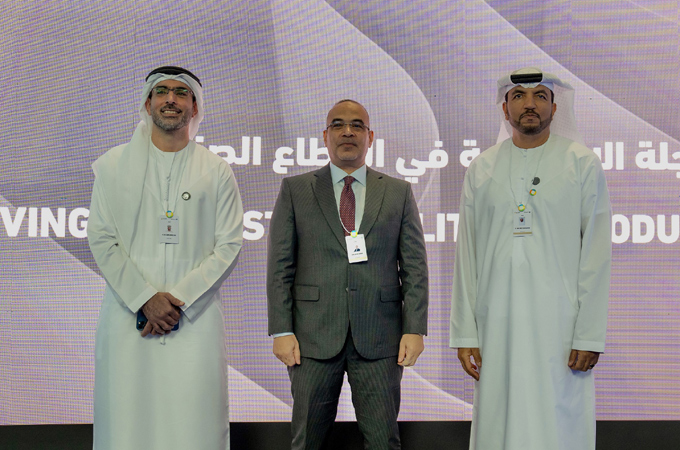
Many UAE manufacturing facilities are ahead of the game in terms of utilising, monitoring and managing energy, according to a new assessment.
The UAE Ministry of Industry and Advanced Technology (MoIAT), in collaboration with the Ministry of Energy and Infrastructure (MoEI) and Schneider Electric, today announced the findings of the nationwide assessment of industrial companies that is designed to help enhance energy efficiency in the industrial sector ahead of the 28th UN Climate Change Conference (COP28) later this year.
Announced during Abu Dhabi Sustainability Week (ADSW), the assessment is the result of a partnership between MoIAT, MoEI and Schneider Electric, which is a member of the Champions 4.0 Network – a core pillar of UAE Industry 4.0 designed to accelerate the integration of 4IR solutions in industry.
The initiative surveyed 46 manufacturing facilities in the UAE operating across sectors such as energy, metals, food and beverage, chemicals, paper and wood, and other segments.
The assessment was divided into two models. The first assessment model measured the maturity of facilities and categorised them into: Basic, Aware, In-Control, and Advanced. The second assessment model measured the readiness of facilities and their prioritisation of energy transformations and sustainability.
The assessment’s findings indicate that there is a significant opportunity for companies to adopt more practices around waste management, such as recycling and re-using, in line with national efforts to create a circular economy.
The report laid out a set of recommendations for policymakers and manufactures to help increase energy efficiency. These included advocating stronger rules on the metering and billing of thermal energy by giving commercial consumers more access to frequent and useful information on their energy consumption.
Several recommendations were developed for manufactures and end-users around sustainable management of assets, waste and product life cycle. It recommended creating sustainability roadmaps and setting hard targets to reduce carbon emissions across the entire value chain. It also stressed the importance of upskilling, education, awareness, and community engagement.
Omar Al Suwaidi, Undersecretary of the Ministry of Industry and Advanced Technology, commented: “Energy efficiency is a key component in the UAE’s approach to enhance the sustainability of our industrial sector. Achieving greater energy efficiency through the adoption of technology helps to reduce emissions, improve the operational performance of our industrial facilities, and promote environmentally friendly practices. Under the umbrella of Make it in the Emirates initiative, we seek to empower industrial companies to adopt 4IR technologies that help them boost sustainability and productivity, and ultimately increase their regional and global competitiveness.”
He added: “We are delighted by the findings of this joint assessment, which provides the manufacturers with a roadmap for transformation towards sustainability and net zero. It demonstrates the positive impact the national industrial strategy, Operation 300bn, is having on the digitalization and efficiency of national industries. As part of this strategy, the Make it in the Emirates initiative helps supercharge industrial priority sectors and attract investments. We continue to build successful partnerships with international players who are eager to capitalize on the significant benefits and potential of establishing an industrial presence in the UAE.”
Eng Sharif Al Olama, Undersecretary of the Ministry of Energy and Infrastructure for Energy and Petroleum Affairs, commented: “The Ministry of Energy and Infrastructure plays a big role in shaping the future of the energy sector for the next fifty years and it has led the country’s effort in achieving resources sustainability through the formulation of the Energy Strategy 2050. Among the supporting programs that have been developed to support the Energy Strategy 2050 is the National Energy and Water Demand Side Management Program 2050, Which includes initiatives to reduce energy consumption for the largest energy-consuming sectors in the country, including the industrial sector. This program aims to reduce energy demand by 40% which will support cost reduction, investment, and sustainability.”
He added: “The results of this sustainability joint assessment will contribute to achieving the objectives of one of the main initiatives in the industry sector within the National Energy and Water Demand Side Management Program 2050 which is the Top 50 Program, that targets improving the efficiency of the top 50 energy-consuming industries in the UAE. This public-private partnership will encourage energy efficiency of the largest industrial consumers in the UAE, and encourage adoption of energy management practices which will build on the country’s efforts toward reducing GHG emissions.”
Ahmed Khashan, Gulf Cluster President at Schneider Electric, said: "Sustainability is a main driver of growth and a competitive advantage for the country’s industrial sector. Technological innovation is the key to driving sustainability. We are delighted to be able to deliver on the commitment we made to the Ministry of Industry and Advanced Technology along with Ministry of Energy and Infrastructure to play a pivotal role in supporting the country’s manufacturing sector in its journey to become greener, more energy efficient, and ultimately net zero." -TradeArabia News Service


















































































